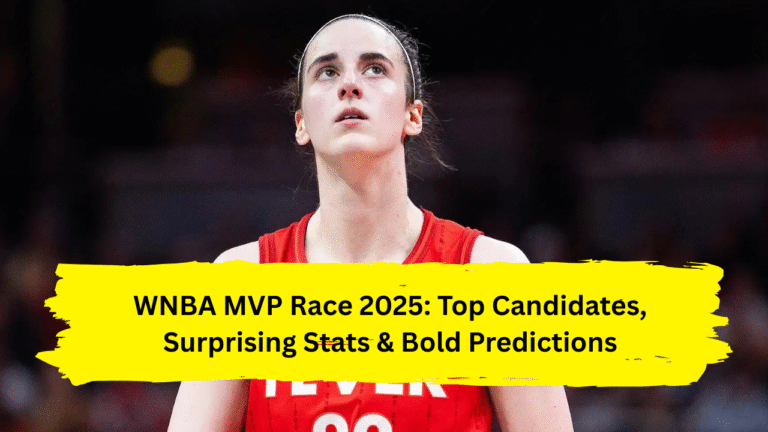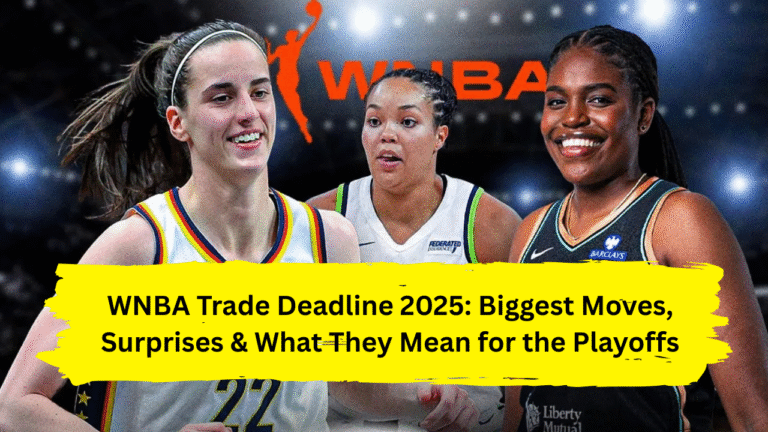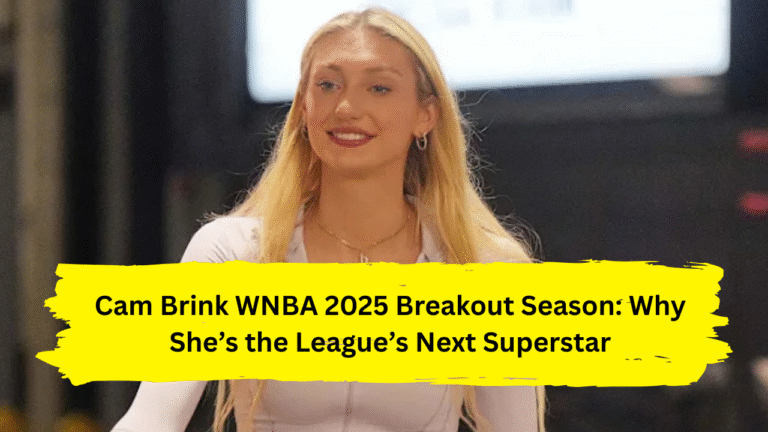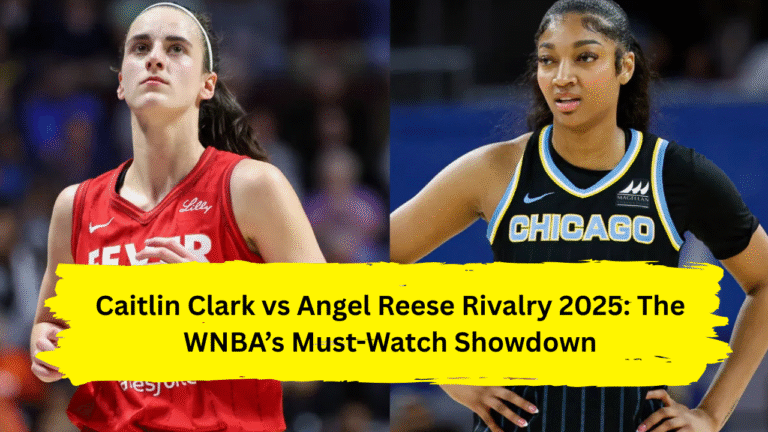
Caitlin Clark nude searches exploded after AI-generated images targeted WNBA stars. Discover how deepfake abuse impacts Clark, Angel Reese, and the league’s “No Space for Hate” fight. Learn protection strategies and support players here!
You’ve seen the toxic rumors spread like wildfire: “Caitlin Clark nude photos leaked.” Headlines scream about “scandals” and “exclusive images.” Social media algorithms amplify the lies. Let’s destroy this false narrative immediately: No authentic nude photos of Caitlin Clark exist. What does exist is a horrifying wave of AI-generated deepfakes weaponized against Clark, Angel Reese, and other WNBA stars—part of a vicious campaign of harassment, racism, and stalking that’s forcing the league into a historic battle for safety . This isn’t about scandal; it’s about exploitation. Why are athletes being targeted? How is the WNBA fighting back? And what can you do to help? We’re breaking it all down.
The AI Nightmare: How “Caitlin Clark Nude” Lies Became Weapons
The explosion of searches for “Caitlin Clark nude” traces back to May 2025, when Chicago Sky star Angel Reese tearfully revealed on her Unapologetically Angel podcast that she’d been targeted by AI-generated nude images—many sent directly to her family members. “People have made AI pictures of me naked. Literally. They sent it to my uncles asking, ‘Are you naked on Instagram?’” Reese stated, emphasizing these attacks came largely from fans of rival Caitlin Clark . Though Reese clarified she holds no animosity toward Clark herself (“Caitlin is an amazing player”), she described a pattern of racially charged harassment: death threats, strangers stalking her home, and fabricated explicit content designed to humiliate and terrorize .
This isn’t isolated. In January 2025, Indiana Fever guard Caitlin Clark faced her own horror: Texas man Michael Lewis, 55, was arrested for stalking after sending her sexually explicit messages and threats via X (formerly Twitter). Court documents reveal Lewis wrote, “Been driving around your house 3x a day… aka Caitlin’s Fieldhouse,” causing Clark such fear she “altered her public appearances and movements” . When confronted, Lewis dismissed it as “fantasy” and “a joke” . The reality? These tactics—real or AI-generated—are tools of control, intimidation, and violation targeting women in sports.
Why Female Athletes? The Ugly Intersection of Fame, Gender, and Race
What drives such violations? Experts point to three toxic triggers: overnight visibility, racialized misogyny, and the dark side of fandom. Clark and Reese didn’t just enter the WNBA; they transformed it. Clark’s 2024 rookie season spiked league viewership by 272%, while Reese set records for rebounds and double-doubles . Their rivalry became a cultural flashpoint, magnifying both their brilliance and the bigotry lurking in some corners of their fanbases.
Reese directly linked the abuse to racism: “I think there’s a lot of racism when it comes to it,” noting how her 2023 NCAA championship taunt of Clark ignited relentless vitriol . After Sky teammate Chennedy Carter committed a hard foul on Clark in June 2024, Carter received rape threats and racist slurs. Another teammate, Diamond DeShields, had her past spinal tumor weaponized against her (“I hope your tumor comes back”) . The pattern is undeniable: Black women like Reese, Carter, and DeShields face disproportionately vicious attacks—a blend of misogynoir and athlete dehumanization.
Clark, meanwhile, grapples with a different but equally dangerous violation: the obsessive stalker framing harassment as “admiration.” Lewis’s messages—”I’m getting tickets. I’m sitting behind the bench”—reveal a mindset viewing Clark not as a person, but as an object to possess .
The WNBA Strikes Back: “No Space for Hate” and Legal Action
Facing crisis, the WNBA launched its “No Space for Hate” initiative in 2025—a league-wide push to ban harassment in arenas and online. The campaign gained urgency after alleged racist slurs were hurled at Reese during a May 17, 2025 Fever-Sky game in Indianapolis. Though an investigation couldn’t substantiate the claims, Commissioner Cathy Engelbert vowed vigilance: “We want our arenas filled with energy—not hate” .
Teams are taking radical steps:
- Enhanced security: After Lewis’s arrest, the Fever banned him from Gainbridge Fieldhouse and secured a no-contact order for Clark .
- Player advocacy: Clark publicly backed the league’s efforts: “There’s no place for racism in our game or society” . Reese praised the WNBA’s support, urging solidarity: “If it could happen to me, it could happen to anyone” .
- Legal pressure: Marion County Prosecutor Ryan Mears charged Lewis with felony stalking (punishable by six years in prison), stating: “It takes courage for women to come forward… [Clark] set an example” .
How You Can Fight Back: Protecting Players and Changing the Game
This isn’t just a WNBA problem—it’s a cultural crisis. But you can help turn the tide:
Report, don’t share: If you see AI nude images or threats targeting athletes, report them to platforms immediately. Sharing—even to condemn—amplifies the harm. Instagram and X now have dedicated channels for deepfake reporting.
Demand policy change: Push lawmakers to pass laws criminalizing non-consensual deepfakes. Only 10 states have such legislation currently. Support federal bills like the DEFIANCE Act.
Redirect your fandom: Celebrate Clark’s historic assists (344 in 2024) and Reese’s record rebounds—not manufactured rivalries. As Reese said: “Me and Caitlin don’t hate each other. It’s just a super competitive game” . Aliyah Boston, Clark’s teammate, put it perfectly: “If it was your daughter on the court, you’d want respect shown” .
The Final Buzzer: Truth Over Toxicity
Let’s be unequivocal: “Caitlin Clark nude” searches lead to exploitation—not reality. They’re tied to a dangerous ecosystem of AI abuse, stalking, and racism impacting Clark, Reese, and countless athletes. But there’s hope in the response: Clark’s courage in pressing charges. Reese’s refusal to stay silent. The WNBA’s systemic push for safety. These women aren’t just basketball players; they’re catalysts for change in how society treats women in the spotlight.
The next time you see a viral “Caitlin Clark nude” rumor, remember: True fandom doesn’t dehumanize. It doesn’t threaten or deepfake. It cheers louder for their three-pointers than their trauma. It fights for their right to exist—athletes, women, humans—unviolated.
Stand with the WNBA’s No Space for Hate initiative. Report harassment via the league’s website. Support Clark and Reese in their next showdown: June 7, Sky vs. Fever (CBS).




